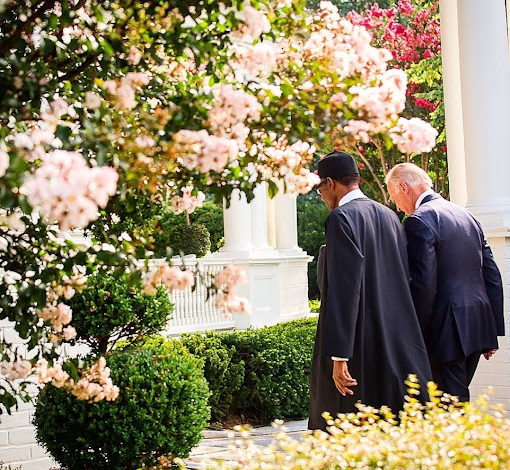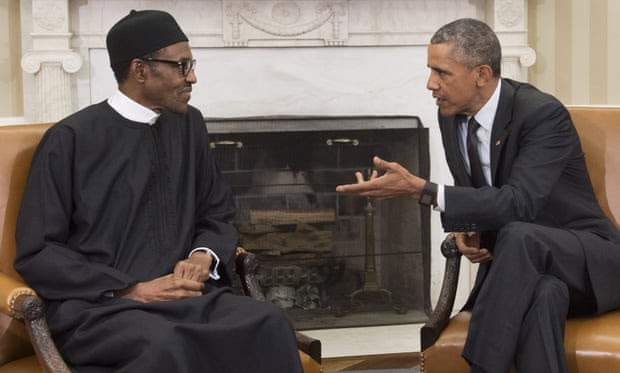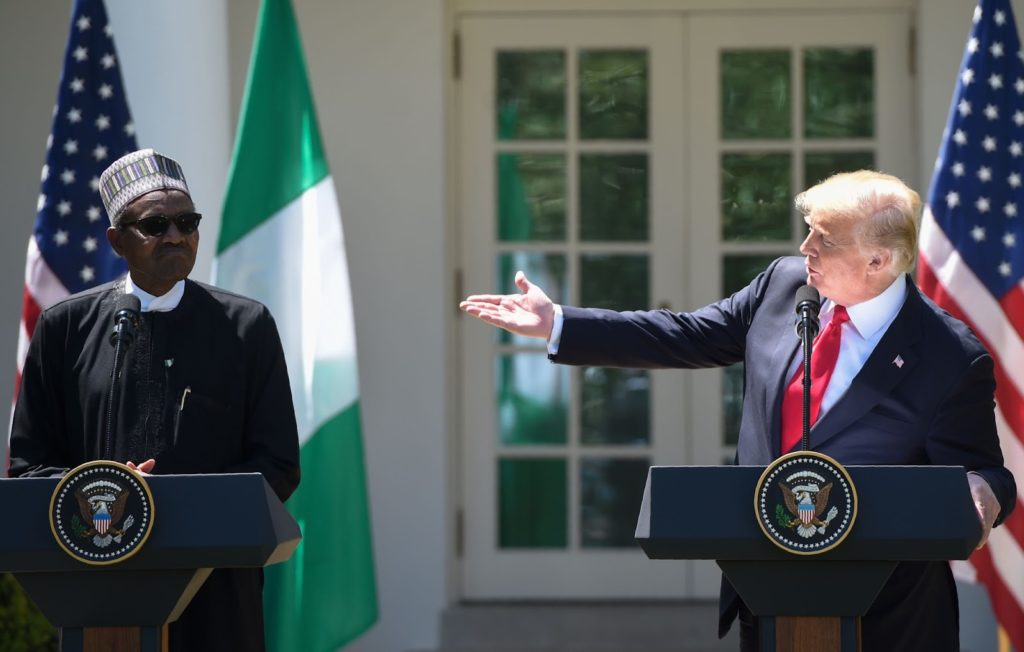Potential Fallout From Halting US-Nigeria Attack Helicopters Deal
Suspension of the proposed sale of military hardware to Nigeria by the U.S. government could help halt shrinking civic space in the former, reawaken the need to improve human rights or create a rift between the two countries and push Nigeria's military cooperation towards China and Russia.

The stalling of the proposed sale of attack helicopters to Nigeria by United States lawmakers could have diverse impacts on security and military relations between Nigeria and the U.S., and also drift Nigeria’s procurement further towards China and Russia.
The foiled deal is coming, despite Nigeria – Africa’s most populous country with an estimated population of more than 170 million people and projected to surpass that of the United States before 2050 – facing multidimensional human security threats.
Aside from the traditional roles of the tri-service armed forces, the military is deployed in the country’s six geopolitical zones due to weak policing, deteriorating security conditions, and to conduct large-scale operations such as those ongoing in the north-west and northeast against religious and non-religious terror groups.
The country has sought to or acquired diverse military capabilities from different countries such as the United Arab Emirates, China, Ukraine, Czech, Russia, South Africa, and the U.S., in an attempt to tackle the myriad of security crises and strengthen the military’s ability to carry out its assignments.
Nigeria-US long bilateral relationship
Nigeria’s long security and military relationship with the U.S., which improved after the country’s move to democracy in 1999, has been broad, ranging from security engagement, military capacity-building opportunities, transfer of pre-owned equipment and purchase of new ones in support of peacekeeping activities in the region, maritime security in the Gulf Of Guinea and the ongoing counter-terrorism – counter-insurgency in the Northeast and Lake Chad Basin.

The relationship, however, weakened under the then President Barack Obama due to corruption and human rights violations concerns, with the U.S. halting training for the army and blocking third party sale of Cobra helicopters to Nigeria in 2014.
The U.S. government also stopped the sale of Tucano aircraft to Africa’s largest democracy following the bombing of a displaced persons camp in Rann town, Borno State, Northeast Nigeria in 2016.
The recent disclosure by Foreign Policy, a news magazine, that top Democrats and Republicans on the Senate Foreign Relations Committee Froze the proposed sale of 12 AH-1 Cobra attack helicopters to Nigeria, signals a potential shift or resetting of the Washington DC approach to Abuja.
The American news outlet also revealed debate among policymakers in Washington on balancing national security with human rights objectives and moves by U.S. lawmakers to push the Biden administration to rethink U.S. relations with Nigeria, amid concerns that President Muhammadu Buhari is drifting toward authoritarianism.
Although the relationship between the two countries got warmer after the election of Nigerian President Muhammadu Buhari and subsequently meeting with the former president Obama on security cooperation and Boko Haram, it took Obama’s predecessor, Donald Trump a different approach to foreign policy and human rights, for the sale of 12 Super Tucano turboprop aircraft to Nigeria to move forward.

“We make the best military equipment in the world, and our friends can now buy that equipment,” Trump said during a joint press briefing in 2018, with his Nigerian counterpart in the Rose Garden of the White House.
Trump also made comments on potential sale of helicopters to Nigeria, saying the Nigerian President likes helicopters. “He likes buying helicopters, and they’re buying a lot of helicopters,” Trump said of the Nigerian leader.
He added that “They weren’t allowed to buy the helicopters for various reasons, which frankly weren’t good reasons. Now they get them, and they get them very quickly, and they are the best helicopters in the world.”
It’s unclear if Trump was revealing parts of a discussion with his Nigerian counterpart on a possible helicopter deal or misrepresented the deal for the turboprop Tucano aircraft.
Although Joe Parkinson, the Africa Bureau Chief for the Wall Street Journal, in a Tweet in Nov. 2020, mentioned that the Trump administration had agreed to sell attack helicopters to Nigeria.
“It was the Trump administration – considerably less bothered by human rights issues—who agreed to sell Super Tucanos for $600m and later, attack helicopters that Nigeria has long hoped would be the game-changer in the fight against Boko Haram,” Parkinson tweeted.
Parkinson had earlier tweeted that, “Nigeria’s president was one of the first African leaders to congratulate Biden, but privately, some of his key advisors were hoping for a Trump victory and are worried. The reasons are quite simple and are linked – human rights, the #EndSARS protests, and weapon sales.”
Nigeria’s president was one of the first African leaders to congratulate Biden but privately, some of his key advisors were hoping for a Trump victory and are worried. The reasons are quite simple and are linked — human rights, the #EndSARS protests, and weapon sales. THREAD https://t.co/ZuRaiiY928
— Joe Parkinson (@JoeWSJ) November 8, 2020
The Biden administration was expected to have more human rights and anti-corruption oriented foreign policy relations with the Nigerian government.
Both countries have continued capacity-building engagement, and the first batch of six Tucano aircraft arrived in Nigeria in July. The aircraft slated for induction in August is expected to carry out counter-insurgency, close air support and reconnaissance missions.
The appearance of normalcy in the relation between the two countries explains the reason behind the reaction and surprise that accompanied the news about the blocking of the proposed sale of the attack helicopters.
An opaque deal
The Nigerian side, through Lai Mohammed, Nigeria’s Minister of Culture and Information, has said it was not aware of the arms deal with the U.S., which some members of Congress blocked.
In a much different tune and response, Chairpersons of security committees at lower and upper parliament told The Punch the Parliament might send a delegation for talks with the U.S. counterparts on the arms sale to Nigeria.
The multiple and divergent statements from within the Nigerian Government sends a wrong message on transparency of the arms procurement process. This is also evident with the lack of public information in the country on the details of the deal, aircraft variant, and supplier.
The botched deal highlights the increasing dependence by the government and military on airpower to prosecute security operations due to escalating insecurity and the lack of sufficient and efficient ground capacity and policing system. The use of combat aircraft over the years has been linked with a series of civilian related casualties in Zamfara, Adamawa and Borno states.
The military could suggest that acquisition of modern airborne platforms will provide sensor technologies that improve the identification of ground targets and allow delivery of precision or guided payload.
As demonstrated in other conflicts theatres like Afghanistan, the employment of modern air power also has limitations and should be part of a broader multidimensional security strategy that involves building the capability of ground forces, support security services, police, intelligence and paramilitary, alongside, addressing socio-economic and in some cases, ideological drivers of insecurity.
A perceived double standard by the U.S.
The U.S. freezing of the arms deal over human rights concerns has renewed scrutiny and criticism of the selective manner in which the U.S. uses human rights when dealing with countries and how countries like Israel and Saudi Arabia use the U.S. and other Western military assets and support for offensive action in Gaza and Yemen that has caused humanitarian suffering and civilian casualties.
In Feb., President Joe Biden announced that he was ending U.S. “offensive” support to the Saudi campaign in Yemen and shifting to defensive support for the oil-rich country. This is coming six years into the conflict that has led to over 230,000 deaths and triggered the world’s worst humanitarian crisis.
Possibility of pushing Nigeria towards China and Russia
The new move by the U.S. is capable of pushing Nigeria further towards China and Russia for military hardware due to the absence of constraints and bottlenecks associated with Westen and US-built platforms.
U.S. foreign policy and military officials have often expressed concerns over growing Chinese and Russian activities in Africa which are usually connected to economic and military ties.
The Nigerian military has historically turned to Russia and, recently, China to fill equipment needs. The Air Force operates the Russian built MI-35M gunships and MI-171, while the Army has acquired tanks, fire support vehicles, and self-propelled artillery systems from China.
About five MI-35M gunships have been delivered and inducted into the Nigerian Air Force. But one of the aircraft crashed in Jan. 2019 while providing close air support for troops in Damasak while battling an attack from ISWAP, a franchise of the Islamic State.
Although the Air Force has not disclosed future deliveries, the service ambition is believed to be around 12 MI-35M gunships, a platform that HumAngle understands has provided enhanced air support and armed overwatch for troops.
In Jan. 2020, a source in the Federal Service of Military-Technical Cooperation told Sputnik the remaining batch of MI-35M was ready for delivery upon payment.
Other options for attack helicopters for the Nigerian military include the mi28NE and China z10 from Russia and China, respectively.
A shift from Westen partners and deterioration in military cooperation and relation will hinder the ability of the U.S. to use that window of cooperation to work with and influence changes in political behaviour and operation of the military, even though the U.S. still has cards considering its role as one of the most critical funding partners for humanitarian programs particularly though USAID and support provisions for the Multinational Joint Task Force.
While US-Nigeria interest has faded away from energy to security due to the Shale oil revolution, security cooperation between the two countries is vital for regional stability and security of U.S partner states.
Support Our Journalism
There are millions of ordinary people affected by conflict in Africa whose stories are missing in the mainstream media. HumAngle is determined to tell those challenging and under-reported stories, hoping that the people impacted by these conflicts will find the safety and security they deserve.
To ensure that we continue to provide public service coverage, we have a small favour to ask you. We want you to be part of our journalistic endeavour by contributing a token to us.
Your donation will further promote a robust, free, and independent media.
Donate HereStay Closer To The Stories That Matter




